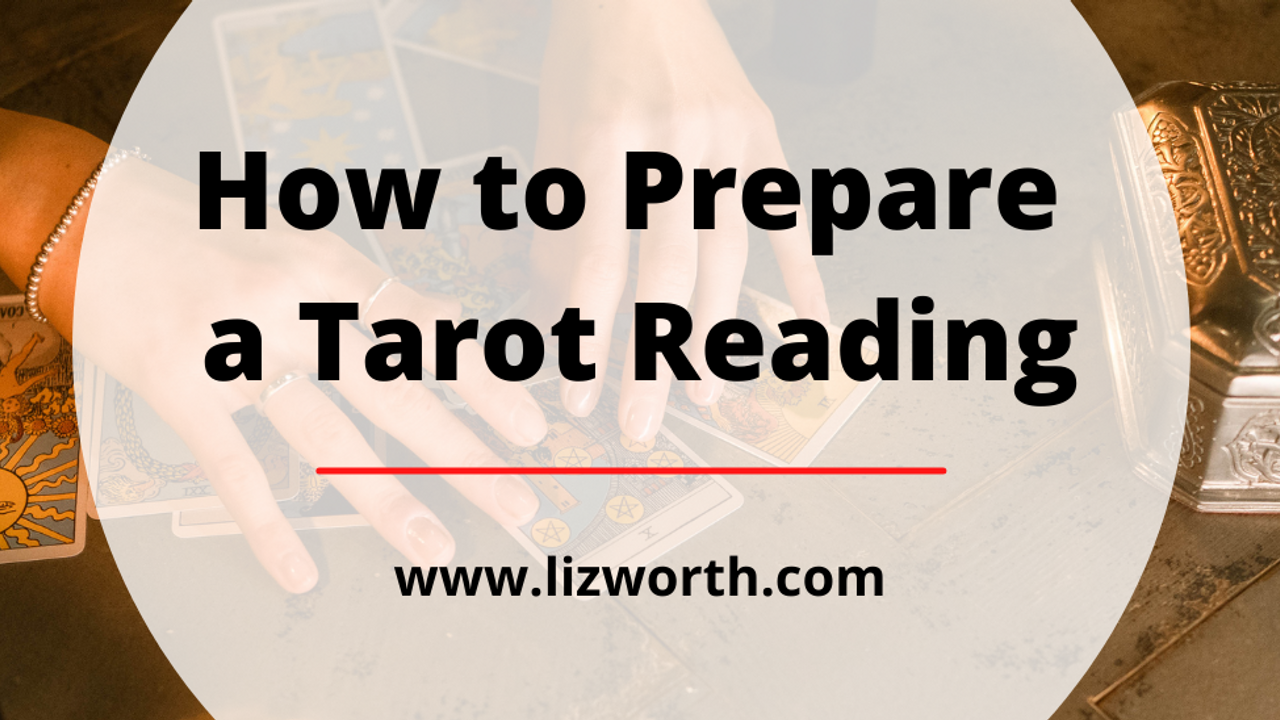How to prepare for a tarot reading

When you’re scheduled to do a tarot reading for someone, what should you do in advance to get ready for it?
Do you have to spend hours in deep meditation?
Should you be clearing your workspace, or clearing your deck?
Setting out crystals or other tools?
You can do all of the above, if you feel it’s necessary.
You can also do none of the above – especially if you don’t feel it adds anything to your process. (That’s right: You can read tarot without any big, fancy rituals involved.)
So what do I do to prepare for a tarot reading?
I like to take advice I received from one of my teachers, Rebecca Gordon: Go out and live your life.
What does that mean?
Go outside. Go about your day.
Watch for any signs, patterns, or themes that might speak to the flavour of the moment.
Tune into the energy of the day: What kind of mood are people in? What’s the pace of the world around you?
This may or may not have anything to do with your reading, or with your querent.
But it will help you be...
Facing insecurity as a tarot reader

Reading tarot, whether for yourself or others, can stir up a lot of insecurities.
It’s normal to feel nervous when you’re reading for someone, especially if you’re still learning. But even experienced readers aren’t immune to a case of the nerves every now and then.
We’re all human, after all. And while reading tarot does get easier with time and experience, it’s still a skill that requires a lot of effort, concentration, and focus.
It also requires readers go out on a limb to offer messages, insights, and interpretations that might feel disparate, unexpected, or unclear at times. Even when a reader feels in flow with their cards, you don’t necessarily know why certain messages are important, or how they connect to a querent’s life.
But your job is to deliver what you’re seeing in the cards, no matter how little you know about the context of someone else’s situation.
That alone can be uncomfortable at times, especially when you have a querent sitting quietly across from you, hangi...
How to keep tarot relevant in a modern world

Occultist Éliphas Lévi (1810 – 1875) wrote that tarot is “the most perfect tool” to understand life.
He believed that "an imprisoned person with no other book than the Tarot, if he knew how to use it, could in a few years acquire universal knowledge."
But whose knowledge would we be acquiring?
Human history is ever-changing, and tarot changes with it.
Tarot dates back to the 1400s, when it humbly began as a card game. It wasn’t until 1909 that the Rider-Waite-Smith deck made its debut.
This was the deck that popularized tarot into what we know it as today. Many of the decks that have been published since, along with the meanings that we associate with each card, have been inspired by the RWS.
But 1909 wasn’t that long ago in the grand scheme of things.
And yet despite its youth in comparison to other systems like astrology, tarot’s potential never ceases to amaze me. The cards work. I still have moments where I find the experience to be uncanny.
I love that we live in the ...
One of my best pieces of advice for tarot readers

One of my best pieces of advice for tarot readers who want to read cards for other people is this:
Listen to your querents.
Like, really listen.
Listen to what is they want to know.
Listen to what they’re worried about.
Listen to what they have to teach you.
As tarot readers, we aim to step into the role of teacher, guide, or mentor. We want to be the ones leading querents to clarity and insight.
But our querents are our teachers, too.
No matter our experience level with tarot, people bring all kinds of questions to tarot readings – questions that you might have never imagined you’d have to answer.
And you can soon realize that as much as people are similar, we are also all on different paths. Eventually, you will have querents whose life experiences are vastly different from your own.
These moments can be challenging, and exciting, for us as tarot readers. They are challenging because they push us to stretch our own language and interpretations of our tarot decks. You are pushed to fit your car...
Divination Won’t Work Without This

One of my favourite ways to use tarot is to get insight into what my options are when I’m at a fork in the road.
For example, last year I was looking into taking a course to learn some new skills. I was checking out at a few different classes and teachers and would have liked to invest in each of them.
But I had to be realistic: I’d set aside a specific budget, and only had so much time to study. Which meant I had to pick one course, not all of them.
So I turned to my tarot deck to see what I could expect from each one, and then compare them.
I do this when I read for clients who are debating decisions as well. You never know what might come up: Sometimes, the options all look quite similar. Other times, there’s a clear winner.
But what how much weight should we give to readings like this?
Are they guarantees, or just glimpses of what’s possible? And are they accurate, or might they lead us astray from a better option?
These are questions I’ve talked through with many clients and students ove...
You don’t have to follow every tarot trend

Are you taking a lot of cues and tarot lessons from social media?
If so, you’re not alone: Tarot’s popularity continues to explode online.
It used to be very hard to find like-minded fans of all things esoteric. Now, all you have to do is hop online and gain instant access to tarot readers from all around the world.
There are so many tarot accounts to check out. And a lot of them post similar content:
- Tarotscopes or readings for each zodiac sign;
- Collective readings for the energy of the day or week;
- "Pick a card" readings where you might choose from a selection of photos and then read the corresponding message.
These can all be fun ways to engage with tarot online.
And they have certainly helped some tarot readers build their social media followings.
But throughout the last year, I noticed some questions coming up in my tarot classes that I hadn’t heard before:
"How do I read tarot for each zodiac sign?"
"Does it matter if I don’t know a lot about someone’s Sun sign before I read f...
How much advice should a tarot reader give to their querents?

What do you when you’re reading tarot for someone, and they want you to just tell them what to do?
This can be a challenging situation for a tarot reader to be put in.
You might feel put on the spot, or pressured to provide an answer that’s not actually in the cards.
It can also be that your style of tarot reading does not fit such a prescriptive approach.
Many tarot readers aim to empower through tarot by encouraging querents to make their own decisions and take control over their lives – which is the opposite of telling them what they should or shouldn’t do.
Reading styles aside, there are fine lines to walk as a tarot reader when it comes to supporting your querents. Tarot readings don’t replace a querent’s personal responsibility over their own lives.
But if you’re perceived as someone who has all the answers, it’s easy for some querents to try to put that onus on you.
I’ve had tarot clients flat out admit that they want me to tell them to quit their jobs. Or to break up with their ...
How to Get Clients as a Tarot Reader

One of the most daunting aspects of building a tarot business is figuring out how to get clients.
I understand the personal frustration, discouragement, and fear that comes with not knowing if you’ll make it as a tarot reader.
There’s a particular level of disappointment that comes when you eagerly check your email hoping to see an influx of new clients and instead, you hear crickets.
It doesn’t matter if your goal is to be a full-time or part-time reader: Either way, you need to be bringing clients onto your schedule on a regular basis if your business is going to become sustainable.
Being hired for your tarot services is the crux of a tarot business: It’s the reason you set up shop to begin with.
But finding those clients isn’t always as easy as it might look. Tarot is as competitive as any other industry, and while there is more than enough business to go around, sometimes it seems like everyone else is succeeding while you’re stuck at square one.
So what are some steps you ca...
Spilling the secrets on building a tarot business

One thing that many tarot readers have in common is how much time we’ve spent developing our skills.
It’s not unusual for spiritual practitioners of all types to spend years training. Many of us consider ourselves life-long students of our craft, always learning and going deeper into esoteric studies.
It’s also not uncommon for us to invest heavily in programs, courses and trainings over the years. If we can’t always afford to take a class, we make up for that in books, blogs, podcasts, and more.
Of course, we know it’s not really about the monetary investment behind a skill set that adds value to the work.
The value comes from practice, experience, and ability. Which often is gained from the sheer amount of time, energy, and practice that goes into learning and then integrating acquired knowledge.
There are a lot of amazing tarot readers out there who are walking around with priceless spiritual knowledge within them.
But when it comes to building a tarot business? That’s where so many great...
What people will remember about your tarot readings

A lot can happen within the span of a tarot reading.
Like any conversation, a reading might cover all kinds of territory within a short period of time. You might start out with one question, and then quickly move to another once the answer is clear.
Or you might meander along the same discussion from start to finish, digging deep into a single issue.
Sometimes readings offer so much information that it’s hard to keep up. Other times, the message might be succinct but circular, as though all signs lead back to the same answer.
When you’re on the receiving end of a tarot reading, the experience can be exciting and fascinating, but also overwhelming.
When you’re the one delivering the reading, you might feel a lot of pressure to capture every detail there is, and to be as clear, helpful, and relevant as possible.
And all of those are good, important aims when we’re reading for others.
It’s also important not to lose sight of what your querents – whether they are friends or paying c...
